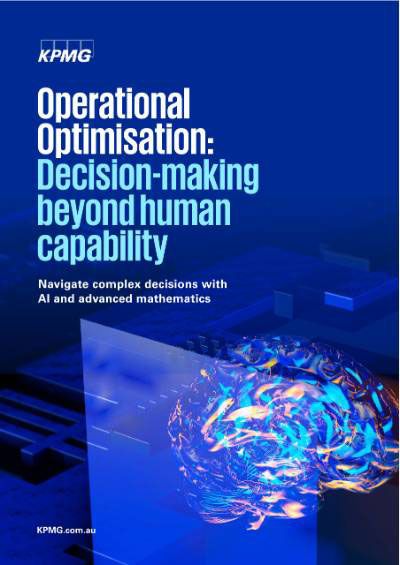Operational decision-making is one of the most powerful – and challenging – aspects of leading a business. Decision distress affects most business leaders, causing them to question or regret decisions they’ve made.
Most leaders understand that the right artificial intelligence and machine learning technology can help them, but many are misguided by the assumption that new software solutions will be too expensive or take too long to develop – or won’t work alongside their business’s systems.
This latest report takes a deep dive into the challenges of decision-making and explores how KPMG and Elara are helping leaders make sound decisions, alleviate risk and optimise operations.
Download the report
Download Operational Optimisation: Decision-making beyond human capability to learn more about how businesses are achieving operational excellence with AI and advanced mathematics.
The decision dilemma at a glance
Business leaders across Australia struggle to make the right decisions, quickly.
Our research shows that human capability leads to increased stress levels and suboptimal results.
Acting on instinct
41% of senior business leaders in Australia say most of their company’s decisions are made on gut feel or instinct alone. 81% report their business suffered the consequences of these decisions.
Human fallibility
Only 40% of finance and operations leaders are ‘very satisfied’ with their ability to compare and combine data across multiple business processes and draw deeper insights as a result.
Substandard capabilities
Only 31% of senior operations managers are very satisfied with their ability to apply advanced analytics to data.
Decision distress
95% of business leaders have suffered from decision distress – regretting, feeling guilty about, or questioning a decision they made in the past year.
Data insecurity
82% of Australian leaders admit the sheer volume of data and their lack of trust in data has stopped them from making any decision at all.
What leaders want
99% of leaders want help from data. In an ideal world, they want data to help them: make better decisions (34%), reduce risk (35%), make faster decisions (34%), make more money (38%) and plan for the unexpected (32%).
Suboptimal decision-making often results in missed opportunities
Australia is experiencing its most significant annual productivity slump since 1979, with output per hour falling 4.5 percent. To enhance efficiency, business leaders need to be able to make complex decisions quickly, without compromising business operations.
Businesses in every sector are faced with thousands of decisions every single day, with each potential choice setting off its own chain reaction across operations. Human error and decision fatigue leads to suboptimal decision-making; this means business leaders often fail to tap into all the opportunities available to their organisation.
For all the countless variables that apply to every decision business leaders need to make, humans are capable of considering only four variables at one time; these variables are inevitably affected by the decision-maker’s personal experiences, preferences and optimism bias.
Even the best decision-makers are bound to come up short when they have an array of complex decisions to make.
How KPMG can help
Optimising operational performance has never been more important and with KPMG and Elara, you can bring greater precision to everyday decision-making.
We combine our deep sector knowledge with domain expertise in business transformation, risk management, digital innovation, strategic consulting and AI.
We will work with you to cut through the complexity, identify untapped potential and seize every opportunity for improvement with Elara's transformative technology.


